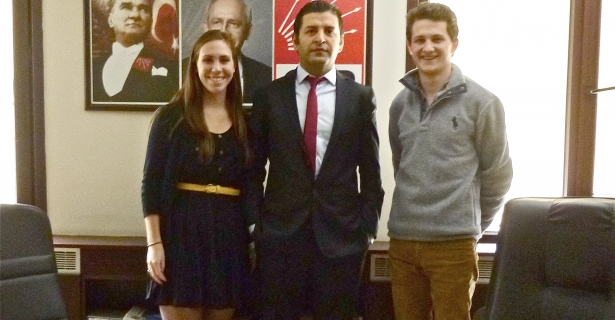Written by Kristin McConnell '15, PPRI Member
A British researcher and journalist we met in Istanbul, Gareth Jenkins, used this old, Persian saying to describe the attitude of Turkish media. The press freedom situation in Turkey is depressing, with the highest number of journalists in jail for their work, and almost all in the profession intimidated into intense self-censorship. Gareth Jenkins believes that this pervasive atmosphere of self-censorship is the most alarming and worrisome attribute of Turkey’s growing press freedom crisis. And as we’ve discovered, those who do speak out often stand alone. Both Gareth and another journalist we met with spoke of a lack of solidarity among Turkish journalists. Journalists are not banning together to fight for press freedom; many are intimidated or do not want to lose their financially pleasing positions.
Much of this silence results from a complicated web of commercial interests of the largest conglomerates in Turkey. A few key massive companies, which run businesses in many other sectors, like oil, transportation, and construction, own the majority of Turkey’s newspapers. These companies are primarily interested in increasing their wealth, and government support is essential to many of their other projects. So, the mainstream media becomes controlled by the financial interests of a few key players and journalists often self-censor to keep their jobs and advance in their careers. Speaking out or standing up for jailed journalists can be risky and most don’t perceive themselves as having the power to do so. In addition, many journalists attach themselves to a particular partisanship, which is often stronger than their identification with their profession. So, many choose to protect their job and livelihood over dangerously speaking out for their fellow reporters. And this cycle allow the government to continue its intimidation in an attempt to silence opposition voices.
Our first few days in Istanbul were hectic: getting lost in heavy snow, missing ferries, trying to find offices on small winding streets. In our meetings, we spoke to regular citizens, foreign academics, Turkish journalists, and an opposition politician. After every meeting, Turkish politics and media seem to become more complicated. The picture in Turkey is far from black and white: the story of an oppressive government silencing a heroic press, while romantically appealing, is largely false. Political and financial interests certainly play into the stories published and news of the mainstream media, but the media is also its own enemy. Rather than a tool of change, Turkish mainstream media has begun to promote the status quo out of an inbred fear that only seems to be increasing with Erdogan’s power grows.


Add new comment